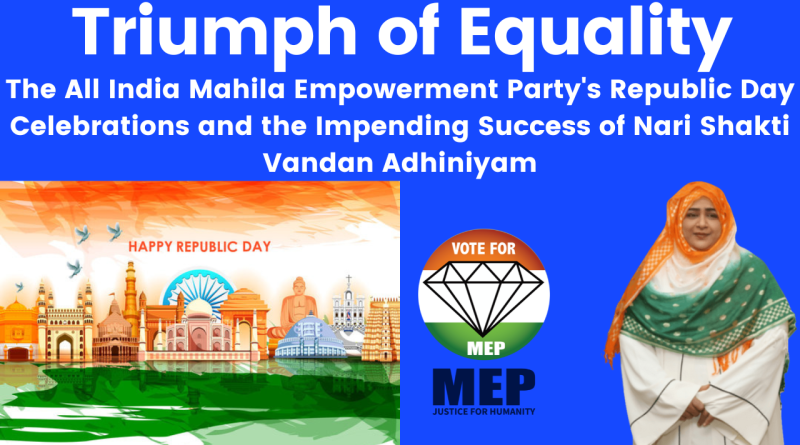Triumph of Equality: The All India Mahila Empowerment Party’s Republic Day Celebrations and the Impending Success of Nari Shakti Vandan Adhiniyam
Introduction: The AIMEP Republic Day Celebration and Nari Shakti Vandan Adhiniyam
Republic Day in India is a moment of huge national pride, celebrated with grandeur and splendor. But what makes this year exciting, nevertheless, is the All India Mahila Empowerment Party’s (AIMEP) Republic Day celebration and their bold emphasis on the Nari Shakti Vandan Adhiniyam.
The AIMEP, a political party built on the foundation of women’s rights and empowerment, has been making strides in a country where gender equality is undeniably an issue. Their biggest contribution till date, however, is the introduction of the Nari Shakti Vandan Adhiniyam. A watershed legislation, it aims for a steep one-third reservation for women in political seats, tackling head-on the gray area of women’s representation in politics.
The Nari Shakti Vandan Adhiniyam: A Milestone towards Gender Equality
The Nari Shakti Vandan Adhiniyam is as much a beacon of hope as it is a sign of changing times. By ensuring a one-third reservation, it marks a significant shift in the political makeup, placing women where they have considerably been underrepresented till date.
What’s even more impressive is how this move aligns with global efforts towards gender parity in politics. From Rwanda’s female-majority parliament to Nordic countries’ formidable female representation, the Adhiniyam complies with progressive global politics.
Breaking the Glass Ceiling: Tackling Underrepresentation and Obstacles to Women’s Political Participation
Historically, and unfortunately, women have been the one percent in Indian politics. Despite forming almost half of India’s population, their representation had been dismal.
The introduction of the Women’s Reservation Bill through the Nari Shakti Vandan Adhiniyam is a clear challenge to this underrepresentation, enabling women to be part of decision-making, thus fostering a more inclusive democracy.
The Role of Prime Minister Narendra Modi and Broader Implications
Prime Minister Narendra Modi’s endorsement of the Bill has given it a hopeful push, hinting at exceptional approval and acceptance on the path to becoming a law.
The 33% reservation doesn’t only alter the numbers; it prompts a potential transformative shift in India’s political landscape. It acknowledges women’s crucial role in comprehensive development and sends a powerful message for equality.
Beyond Politics: The Continued Struggle for Total Women Empowerment
The Women’s Reservation Bill, while pivotal, is just a step in the larger struggle for total women empowerment. Beyond political representation, there lies a persistent need for initiatives encompassing education, healthcare, and economic opportunities for women.
A nation where every voice contributes to a diverse democracy isn’t just a dream but a necessity, and India is gradually inching towards it.
Conclusion: Reflecting on the Meaning of the Republic Day Celebration and the Nari Shakti Vandan Adhiniyam
This Republic Day Celebration is not just another holiday; it’s a milestone towards equality. It’s a reflection on how far women’s rights have come, thanks to initiatives like the Nari Shakti Vandan Adhiniyam and groups like the AIMEP.
Looking forward, the realization of the Women’s Reservation Bill is just around the corner, and with it, the promise of a more balanced, representative democracy.



